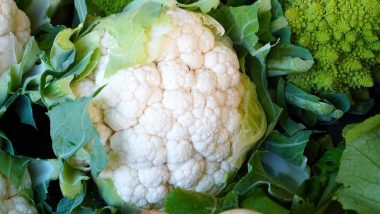Brussels sprouts are a cruciferous vegetable, a cousin to veggies like broccoli, cauliflower, kale, cabbage and collard green. The appearance of this vegetable is similar to mini cabbages that are typically cut, cleaned and cooked to make a nutritious side dish or main course. The best part about brussels sprouts is that they are low in carbohydrate and can go well in the ketogenic diet. We bring you brussels sprouts health benefits, which include maintaining blood sugar to building strong immunity. Zucchini Health Benefits: From Weight Loss to Healthy Heart, Here Are Five Reasons to Eat This Vegetable.
Brussels sprouts are a powerhouse of nutrients as this vegetable is loaded with essential vitamins and minerals. As per NutritionData, 78 g of cooked brussels sprouts consist of 28 calories which comprise of 2 g proteins, 6 g carbohydrates, 2 g fibres. As for micronutrient content, 78 g of this cruciferous vegetable can provide 137 per cent of the recommended daily intake (RDI) of vitamin K, 81 per cent RDI of vitamin C, 12 per cent RDI of vitamin A, 12 per cent RDI of folate and 9 per cent RDI of manganese. Let's check out some health benefits of this vegetable. Broccoli Health Benefits: From Strong Heart to Good Eye Health, Here Are Five Reasons Why You Should Eat This Nutrient-Dense Vegetable.
Brussels Sprout Health Benefits
1. Maintaining Blood Sugar - Due to the presence of high fibre content, brussels sprouts help maintain healthy blood sugar levels. As per a study published in the National Institute of Health, fibre moves slowly through the body undigested and slows the absorption of sugar into the blood.
2. Good For Bone Health - Vitamin K in brussels sprouts plays a vital role in improving bone health. As per a study published in the National Institute of Health, vitamin K makes the bone strong and prevent osteoporosis, a condition characterised by progressive bone loss.
3. Strong Immune System - Brussels sprouts are loaded with vitamin C which helps boost immunity by fighting free radicals that damage the cell and cause oxidative stress.
4. Good For Heart Health - Brussels sprouts are high in plant-based omega 3 fatty acids with 135 mg of alpha-linolenic acid (ALA) in 78 g of this vegetable. Thus, they have been shown to reduce blood triglycerides which help improve heart health.
5. Reduce Risk of Cancer - As per a study published in the National Institute of Health in the year 2008, brussels sprouts could protect against carcinogens, cancer-causing agents, and prevent oxidative damage to cells. Also, antioxidants in this cruciferous vegetable can neutralise free radicals which are formed by oxidative stress that contribute to diseases like cancer.
Brussels sprouts can be eaten boiled, roasted or baked as a side dish. This cruciferous vegetable can also be added to pasta, frittatas or stir-fried dishes for a flavourful meal.
(This article is written for an informative purpose and should not be substituted for medical advice. Kindly consult your doctor before trying any tips.)
(The above story first appeared on LatestLY on Dec 01, 2020 08:56 AM IST. For more news and updates on politics, world, sports, entertainment and lifestyle, log on to our website latestly.com).













 Quickly
Quickly




















